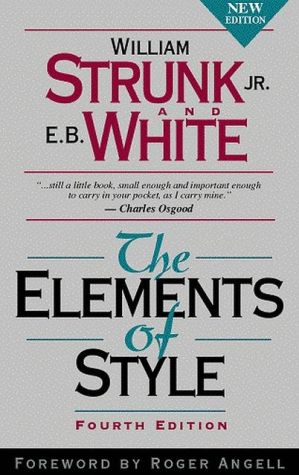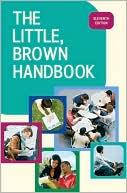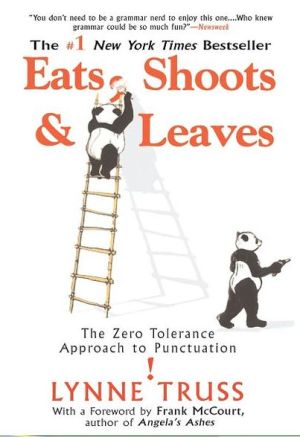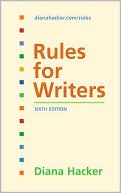The Glamour of Grammar: A Guide to the Magic and Mystery of Practical English
Early in the history of English, the words "grammar" and "glamour" meant the same thing: the power to charm. Roy Peter Clark, author of Writing Tools, aims to put the glamour back in grammar with this fun, engaging alternative to stuffy instructionals. In this practical guide, readers will learn everything from the different parts of speech to why effective writers prefer concrete nouns and active verbs. The Glamour of Grammar gives readers all the tools they need to"live inside the language"...
Search in google:
Early in the history of English, the words "grammar" and "glamour" meant the same thing: the power to charm. Roy Peter Clark, author of Writing Tools, aims to put the glamour back in grammar with this fun, engaging alternative to stuffy instructionals. In this practical guide, readers will learn everything from the different parts of speech to why effective writers prefer concrete nouns and active verbs. THE GLAMOUR OF GRAMMARgivesreaders all the tools they need to"live inside the language"—to take advantage of grammar to perfect their use of English, to instill meaning, and to charm through their writing. With this indispensable book, readers will come to see just how glamorous grammar can be. The New York Times - Ammon Shea While The Glamour of Grammar will not replace Fowler or Strunk and White, nor render obsolete more contemporary and comprehensive guides, like Bryan A. Garner's Modern American Usage, it is a welcome addition to the bookshelf of anyone who cares about language—and is willing to argue about it.
Introduction: Embrace grammar as powerful and purposeful 1\ Part 1 Words 7\ 1 Read dictionaries for fun and learning 9\ 2 Avoid speed bumps caused by misspellings 14\ 3 Adopt a favorite letter of the alphabet 18\ 4 Honor the smallest distinctions even between a and the 21\ 5 Consult a thesaurus to remind yourself of words you already know 27\ 6 Take a class on how to cross-dress the parts of speech 31\ 7 Enjoy, rather than fear, words that sound alike 35\ 8 Learn seven ways to invent words 40\ 9 Become your own lexicographer 45\ 10 Take advantage of the short-word economy of English 49\ 11 Learn when and how to enrich your prose with foreign words 55\ Part 2 Points 61\ 12 Use the period to determine emphasis and space 63\ 13 Advocate use of the serial comma 68\ 14 Use the semicolon as a "swinging gate" 72\ 15 Embrace the three amigos: colon, dash, and parentheses 77\ 16 Let your ear help govern the possessive apostrophe 82\ 17 Take advantage of the versatility of quotation marks 85\ 18 Use the question mark to generate reader curiosity and narrative energy 89\ 19 Reclaim the exclamation point 94\ 20 Master the elliptical art of leaving things out 98\ 21 Reach into the "upper case" to unleash the power of names 103\ 22 Vary your use of punctuation to create special effects 108\ Part 3 Stamdards 111\ 23 Learn to lie or lay, as well as the principles behind the distinction 113\ 24 Avoid the "trap" of subject-verb disagreement 117\ 25 Render gender equality with a smooth style 121\ 26 Place modifiers where they belong 128\ 27 Help the reader learn what is "essential" and "nonessential." 131\ 28 Avoid case mistakes and "hypergrammar." 135\ 29 Be certain about the uncertain subjunctive and other "moody" subjects 138\ 30 Identify all sources of ambiguity and confusion 143\ 31 Show what is literal and what is figurative 148\ Part 4 Meaning 153\ 32 Join subjects and verbs, or separate them for effect 155\ 33 Use active and passive verbs in combination and with a purpose 162\ 34 Befriend the lively verb to be 168\ 35 Switch tenses, but only for strategic reasons 173\ 36 Politely ignore the language crotchets of others 179\ 37 Learn the five forms of well-crafted sentences 183\ 38 Make sentence fragments work for you and the reader 187\ 39 Use the complex sentence to connect unequal ideas 193\ 40 Learn how expert writers break the rules in run-on sentences 197\ Part 5 Purpose 203\ 41 Master the uses of nonstandard English 205\ 42 Add a pinch of dialect for flavor 209\ 43 Tame taboo language to suit your purposes 215\ 44 Unleash your associative imagination 220\ 45 Play with sounds, natural and literary 226\ 46 Master the distinction between denotation and connotation 231\ 47 Measure the distance between concrete and abstract language 238\ 48 Harness the power of particularity 244\ 49 Have fun with initials and acronyms, but avoid "capital" offenses 251\ 50 Master the grammar of new forms of writing 256\ Afterword: Live a life of language 263\ Appendix A Words I have misspelled 265\ Appendix B Words I have confused 271\ Appendix C The Glamour of Grammar quick list 277\ Acknowledgments 282\ Index 285
\ Publishers WeeklyGrammar is a subject that typically induces wincing, wheezing, or worse. Clark, a lifelong whiz at the subject, wants readers to fully appreciate the importance of good grammar and the qualities of superior writing. To that end, he has laid out several entertaining, easy-to-follow rules, governing everything from punctuation to alliteration, that promise to dramatically improve one's writing and develop an appreciation for language. Clark draws on examples ranging from DeLillo to Rowling, a breadth of text that readers will appreciate as much as the author's humorous approach. Who knew that a discussion of grammar could induce laughter? This is an eminently readable, extremely enjoyable guide that readers will find highly useful on their path to development, not just as writers, but as readers. \ Copyright © Reed Business Information, a division of Reed Elsevier Inc. All rights reserved.\ \ \ \ \ Library JournalJournalist and teacher Clark (vice president & senior scholar, Poynter Inst.; Writing Tools) takes readers through a well-paced presentation, defining English grammar as a set of tools, rather than rules. Like Dunton-Downer (see review below), he conveys the magic that is to be found in English, in its ever-active evolution. Yet he stresses that users of English must understand the systems behind the magic in order best to convey magic themselves. As a teacher—and he writes here in a teacher's voice—he is excellent at explaining elusive topics such as the subjunctive and the serial comma, often comparing English to other languages whose different approaches illuminate our own. Each short section of the five main chapters ends with "Keepsake" reminders. The nuts-and-bolts information here is best for adults young and old in search of grammatical aid; yet Clark's erudition may be better appreciated by those who know their grammar. In either case, a rewarding purchase.\ \ \ Ammon SheaWhile The Glamour of Grammar will not replace Fowler or Strunk and White, nor render obsolete more contemporary and comprehensive guides, like Bryan A. Garner's Modern American Usage, it is a welcome addition to the bookshelf of anyone who cares about language—and is willing to argue about it.\ —The New York Times\ \ \ \ \ Yvonne Zipp…in his engaging, sometimes downright funny study of English…Clark makes for the most genial grammarian since the singing conductor on "Schoolhouse Rock."\ —The Washington Post\ \







